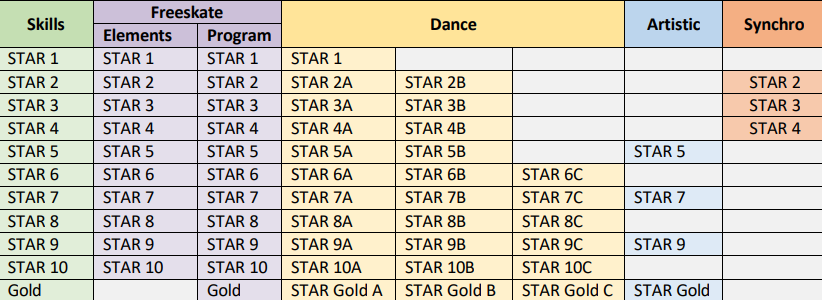How StarSkate Works
The StarSkate program consists of figure skating skills in four areas – Skills, Ice Dance, Free Skate and Artistic. Each area is divided into the following levels:

StarSkate Pathways
Once a skater is in the Skate Canada StarSkate Program, there are several options. Skaters may choose to remain in the StarSkate Program, taking assessments (although not mandatory) at organized assessment sessions and honing learned skills. Skaters may also choose to enter competitions, while still trying Skate Canada assessments. Other skaters may feel that they have progressed to a point where they may wish to enter the Skate Canada Podium Pathway or become involved in synchronized skating, evaluating or judging, or participate as an adult.
Skills:
Skills are a combination of fundamental skating movements, executed on a pattern and skated solo. The basic components of all disciplines of figure skating are incorporated into the program. The movements are derived from former compulsory figures, free skating and ice dance. The objective of the Skills program is mastery of the basic fundamentals of skating – edge quality, control, power and speed.
Ice Dance:
Ice Dance consists of 12 levels of assessments. The Dance assessment program teaches timing, musicality, rhythm interpretation, structure as well as basic skating skills such as edges, flow, control and unison.
The dances in the StarSkate Program can be tried in any order but a candidate must pass the required number of dances in a dance assessment before proceeding to the next level.
Freeskate:
Freeskate consists of the execution of jumps, spins, footwork, field movements and stroking, either in isolation or performed in sequence to music.
There are 20 Freeskate assessments in the StarSkate Program:
Artistic:
The focus of the Artistic discipline is the development of program components, musical movement and creativity. Artistic combines skating aspects such as turns, edges and field moves, with creative spins and the ability to project emotion and artistry. The aspects developed through Artistic assessments benefit every discipline in skating.
Skaters must have completed Star 4 Skills prior to entering Star 5 Artistic.
There are four Artistic program assessments in the Star 1 – Gold structure: Star 5, Star 7, Star 9 and Gold
Competitions For StarSkate Athletes:
StarSkate participants love to compete! Our feedback indicates that even though a skater may choose not to participate in the Skate Canada Podium Pathway Program, they still want the opportunity to assess their skill in a competition situation. Skate Canada offers several opportunities to do this.
https://skatenl.com/wp-content/uploads/2024/07/Skate-NL-Events-2024-2025.pdf
Club Competitions
Clubs offer competitions for their own members to compete against each other.
Interclub Competitions
These are events involving a number of clubs in the same region or area.
Interclub information to be determined.
